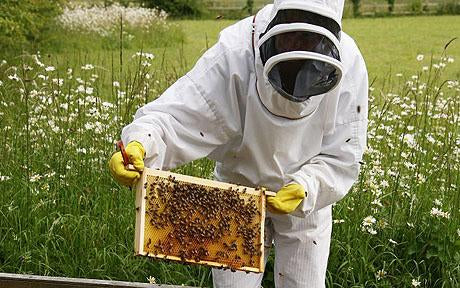
Planning for Spring!
David MullinsShare
Yep, you read that right. There may be a foot of snow on the ground and below zero temps on their way next week, we're watching the calendar for March! If you read my last blog, you saw that we've done our winter mite treatment and fed the bees to help them survive the winter. Now, it's time to get them ready to survive the rest of the winter until late April and early May when dandelions bloom. Around here, bees die from March through May because they run out of honey in the hives. We can also get really wet springs when they can't get out and gather any nectar.
If you've seen reports in past months about the 25-40% rate of beehive loss across the U.S., you know honey bee colonies are threatened. I was surprised to read a report and hear an interview with a leading honey bee research in Washington, DC, explain that honeybee farmers were able to replace colonies of honey bees we lose so there still were about 3 million hives across the country. While we do replace the hives we lost, that doesn't mean everything is ok. It's not! Splitting existing hives into new colonies depends on the health of a new queen we rear or purchase. It depends on the total number of hives a beekeeper has to split. And, it depends on a significant amount of time and energy to feed the new colonies to get them strong enough to last the winter, which means we typically don't get honey off the hives the first year.
If you've read my other blogs, you know the cause of honey bee decline is threefold. First, pesticides are outright killing bees. Second, herbicides are killing their food sources. Third, the combination of pesticides and herbicides weakens the bees, making them more susceptible to disease and mite infestation. A recent study released this month suggests that queen bees are dying at a much faster rate due to chemicals in the environment and disease as well.
So, it's pretty well known by biologists that the ability to reproduce in any animal is a tradeoff with immunity. Reproducing takes a ton of energy, and so does fighting off infections, parasites, etc. Queen bees appear to be in that same boat. The study I mentioned indicates that queen bees with strong immune systems don't lay eggs as long as queen bees with weaker immune systems. Beekeepers have known for a while that although a queen - of which there is only one in each hive - may live up to 5 years, she won't be a good layer for more than a couple of years. Many commercial beekeepers replace their queens every 6 months to one year. According to the study, queen bees are losing their ability to lay viable eggs for multiple years because their bodies are fighting off the effects of disease that is more common in hives than it once was just a couple decades back.
So what does all this mean for Bee Great? Well, it means we're following the science. This year, we're bringing in 40 queens from Mississippi, and splitting our existing hives. We'll add each queen to 40 new honey bee colonies. We'll have about 60 hives by the beginning of May this year. Believe it or not, we started this plan in December of last year when we ordered the queens.
By the middle of March, we'll add pollen substitute to the top of each of our hives to provide the protein the bees need to feed the brood. Those baby bees need a lot of care, and the nurse bees will use the protein to feed them. It takes about 3 weeks for the egg laid by the queen to become a mature honey bee. She'll start laying eggs in earnest in March so the hive is as full as possible with bees by the nectar flow in June.
So, although I'm watching the wind blow the snow across the pond out our window right now, I know in about a month the process of getting the hives ready to split will begin. Can't wait to get back out in the bee yard!
It also means we need you to buy our honey! How's that for honesty? If you don't buy our products, we can't afford to create new colonies of bees to replace the inevitable number that will die this year. And, we need to be able to grow as well. We need more hives so we can produce more honey and beeswax. We're also selling some of our bees this year in the form of 5-frame nucs. So, if you're interested in helping the bees, buy our products, order our nucs, and/or order our beekeeping service and we'll keep bees at your property for you.
As always, thanks for reading our blogs and Bee Great Today!
